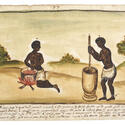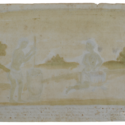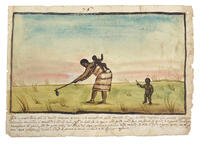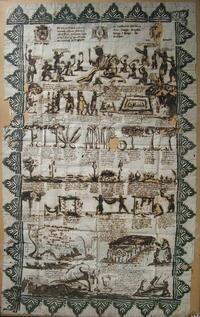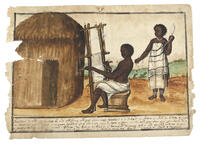You are here
PW077: Mortar called Pilaom
2: mortare d:o Pilaom1 fatto di legno dove pestana la massa o sia granturco; p[er] farne farina; con la quale fan[n]o il loro pane fatto in forma della nostra Polenta 2: stampa con cui pestano 3: don[n]a negra che pesta 5: caldaro fatto di terra dove intridano il d:o pane 4: don[n]a que cucina e fà il d:o pane 6: vezzi fatti di vetri o margaritine di vari colori che in vece di portarli nel collo gli portano a piedi. qua non vi sono mulini, ma ciascheduno si pesta a sua massa facendo cosi la fuba2 o sia farina
[verso in Portuguese] A negra pizando a filhos Cambresy[?]
1: mortar called pilaom made of wood in which they pound the maize or corn to make flour; with which they make their bread made in the manner of our Polenta 2: pestle with which they pound 3: black woman who pounds 5: caldron made of earth where they knead said bread 4: lady who cooks and makes the said bread 5: bread 6: ornaments made of glass or beads of various colors which instead of wearing around the neck they wear at the feet. there are not mills here, but each one pounds their own maize to make the fuba i.e. flour
[verso in Portuguese] The black woman pounding children Cambresy[?]
- Add new comment
